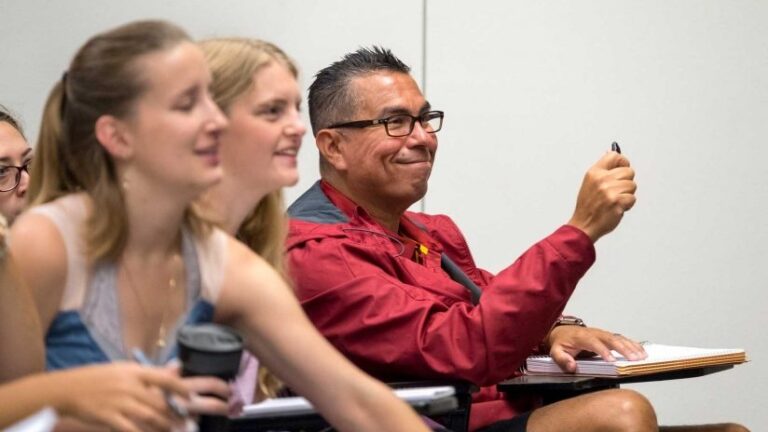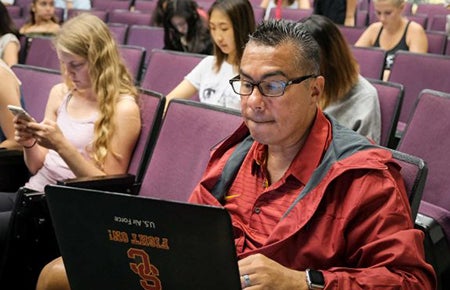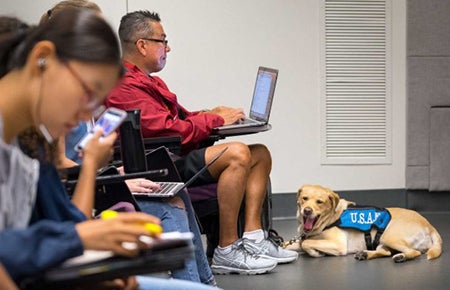
Courageous Iraq veteran with PTSD brings valuable life experience to USC Dornsife
Before Cesar Jimenez Jr. takes off for a day of classes at USC Dornsife, he and his wife, Teresa, go over the checklist.
Wallet, check. Keys, check. Phone, check. Laptop and charger, check.
“I make sure I have everything,” he said. “My computer is charged to 100 percent.”
For Jimenez, 50, starting his first year as a sociology major at USC Dornsife is a big step.
He’s led a fulfilling life — a roughly 30-year career with both the United States Air Force and the Social Security Administration, two children and a loving wife.
But at the age of 42, Jimenez was injured during a deployment to Iraq — one of about a dozen total deployments — and it changed the future he had imagined for himself.
A dangerous mission
In Dec. 2009, he was sent to Balad, 40 miles north of Baghdad. The U.S. airbase was dubbed “Mortaritaville” by soldiers due to the ubiquity of small explosives.
“We got bombed, shot at, almost every moment of every day,” Jiminez said.
Although he fell unconscious during the attack, he remembers most of what happened that night in April: He was loading a C-17 cargo plane in the dead of night when insurgents got into the area.
“They were firing at us and throwing mortars at us,” he said.
The airmen had lights hooked to generators while they worked, making it almost look like daylight. To the insurgents, they were spotlights. The soldiers were sitting ducks, he said.
“A mortar exploded … and threw me back about 200 feet,” he said. “It blew up my truck, my Humvee.”

Cesar Jimenez Jr. focuses on classwork.
Jimenez blew out his shoulder. It took nearly two years to identify his traumatic brain injury, which left him with cognitive delays. He was depressed, and attempted suicide 10 times. He credits his wife for getting him a team of doctors and therapists that he meets multiple times a week — now fitting in those appointments around classes.
He met Teresa while working at the Social Security Administration. They were work pals, both divorcees with kids. They sometimes went to the movies together, but it was always platonic.
While he was away, they kept in touch. They sent emails. He walked three miles to the USO every morning — under fire the whole way — to call her before she went to bed. Sometimes they’d talk for hours.
“That’s what kept me alive,” he said.
When he came home, everything was different. He couldn’t go back to the job he loved.
He wanted to take care of Teresa; instead, she took care of him.
“I didn’t feel like a man anymore,” he said. “I didn’t have a purpose in life.”
Together they learned about PTSD, therapy and rehabilitation. They dated for a year and then Jimenez had all their emails bound into a book, took her to a fancy dinner in Beverly Hills and asked her to marry him. They wed in 2011.
“She’s the only reason why I keep going,” he said.
Thoughts of college
A high school graduate and son of Mexican immigrants — his mother a saleswoman, his father a sheet metal worker — Jiminez thought academia had passed him by. But one day, feeling the monotony of his unwanted retirement, he thought about nearby Pasadena City College (PCC).

Cesar Jimenez Jr.’s service dog, Baylee, is with him at all times.
“I asked my wife what she thought about me going back to school,” he said. “She said, ‘Do you think you can do it?’ I said, ‘I don’t know, but I’ll give it a shot.’”
Initially, it was hard. His last and worst suicide attempt derailed him for a year. But he got help and he got Baylee, his yellow Labrador service dog. She’s always at his side.
“She knows when I’m feeling depressed,” he said. “She senses it and she comes and lays with me by my feet.”
Jimenez ended up finishing his associate’s degree at PCC in two years, not missing a class or a semester over that time. He met veterans who had been admitted to USC and heard it was a veteran-friendly school. It became the only school he applied to, and he is now the first in his family to attend a four-year college.
He remembers when he found out he got in. It was a couple of months ago, during a summer session course at PCC.
“I yelled out ‘I got accepted to USC!’” he said. “My professor, who wrote one of my letters of recommendation, stood up and went ‘Did you really get in?’ and everyone got up and clapped.”
He wants to go back to helping people, like he did filing claims for folks at the Social Security Administration. A sociology major, he wants to start his own business connecting low-income residents and veterans in South and East L.A. with government programs or benefits.
“I want to help people less fortunate,” he said.
A couple of weeks into the semester, the busy campus and intense workload can be overwhelming, but he is taking it all moment by moment.
Coping with the unexpected
When something unexpected happens, Jimenez can get anxious — like when a book he’s supposed to read isn’t on his computer.
His memory and involuntary decision-making were impacted, so he constantly checks his iPhone calendar to make sure he’s on track. A tutor, provided by the U.S. Department of Veterans Affairs, visits his house to help him with his studies.
His professors are supportive, one making special office hours for him. And having Baylee helps, letting him know things are going to be all right.
Even though it’s scary, it’s also tremendously rewarding, he said.
“I can bring my life experiences to the classroom. I’m probably older than my professors,” he said. “I can see that students are really listening to what I have to say. In a sense, I am making a difference in their lives.”